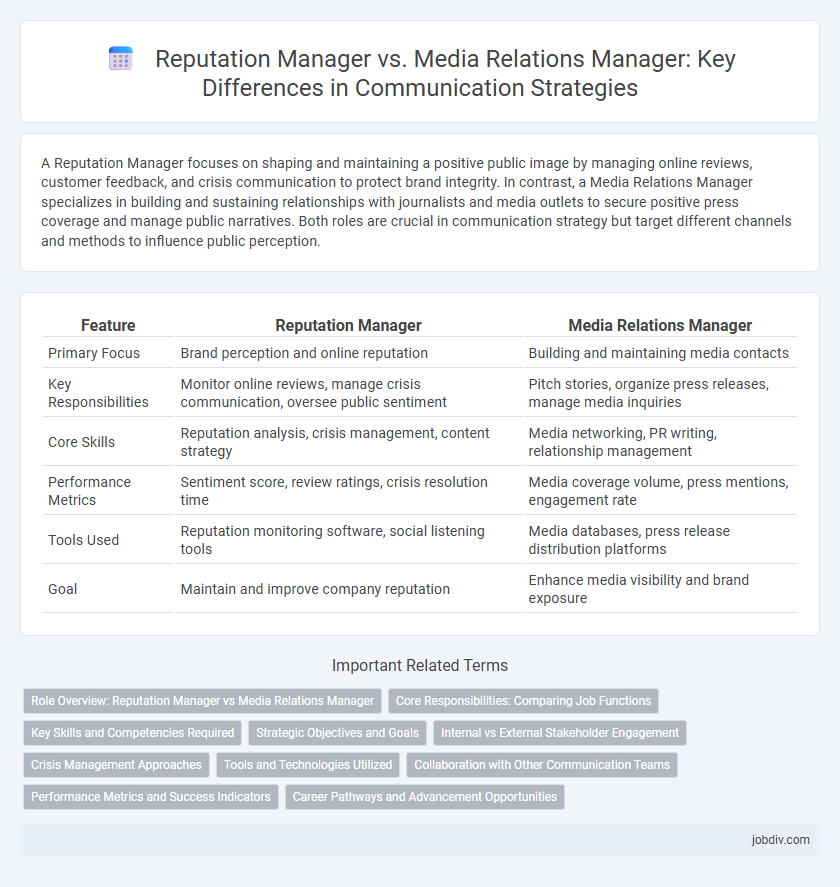A Reputation Manager focuses on shaping and maintaining a positive public image by managing online reviews, customer feedback, and crisis communication to protect brand integrity. In contrast, a Media Relations Manager specializes in building and sustaining relationships with journalists and media outlets to secure positive press coverage and manage public narratives. Both roles are crucial in communication strategy but target different channels and methods to influence public perception.
Table of Comparison
| Feature | Reputation Manager | Media Relations Manager |
|---|---|---|
| Primary Focus | Brand perception and online reputation | Building and maintaining media contacts |
| Key Responsibilities | Monitor online reviews, manage crisis communication, oversee public sentiment | Pitch stories, organize press releases, manage media inquiries |
| Core Skills | Reputation analysis, crisis management, content strategy | Media networking, PR writing, relationship management |
| Performance Metrics | Sentiment score, review ratings, crisis resolution time | Media coverage volume, press mentions, engagement rate |
| Tools Used | Reputation monitoring software, social listening tools | Media databases, press release distribution platforms |
| Goal | Maintain and improve company reputation | Enhance media visibility and brand exposure |
Role Overview: Reputation Manager vs Media Relations Manager
A Reputation Manager focuses on shaping and maintaining a positive public perception by managing brand image, handling crisis communication, and monitoring online sentiment through social media and review platforms. A Media Relations Manager specializes in building and nurturing relationships with journalists, crafting press releases, and securing media coverage to promote favorable publicity. Both roles require strategic communication skills but differ in their primary focus on reputation maintenance versus media engagement.
Core Responsibilities: Comparing Job Functions
A Reputation Manager focuses on monitoring and enhancing a brand's public image through strategic crisis management, online reputation monitoring, and stakeholder engagement. In contrast, a Media Relations Manager primarily handles building relationships with journalists, crafting press releases, and securing media coverage to shape public perception. While both roles aim to influence public opinion, the Reputation Manager emphasizes long-term trust and crisis response, whereas the Media Relations Manager concentrates on proactive media outreach and messaging.
Key Skills and Competencies Required
A Reputation Manager requires expertise in crisis communication, brand strategy, and stakeholder engagement to safeguard and enhance organizational image. Media Relations Managers must excel in persuasive communication, media networking, and content creation to build strong press relationships and secure positive coverage. Both roles demand strategic thinking, adaptability, and proficiency in digital communication tools to effectively manage public perception and media interactions.
Strategic Objectives and Goals
A Reputation Manager prioritizes maintaining and enhancing an organization's public image by monitoring brand perception, managing crises, and implementing long-term reputation strategies that build trust and loyalty. In contrast, a Media Relations Manager focuses on cultivating relationships with journalists and media outlets to secure positive coverage and manage the flow of information aligned with corporate messaging. Both roles aim to strengthen organizational credibility, but the Reputation Manager addresses overall public sentiment, while the Media Relations Manager targets proactive media engagement and message dissemination.
Internal vs External Stakeholder Engagement
A Reputation Manager primarily focuses on internal stakeholder engagement by fostering trust and alignment within the organization to enhance overall brand integrity. In contrast, a Media Relations Manager engages external stakeholders, including journalists and the public, to shape and maintain the organization's public image. Effective communication strategies in each role ensure tailored messaging that meets the distinct needs of internal teams versus external audiences.
Crisis Management Approaches
A Reputation Manager prioritizes safeguarding brand integrity during crises by implementing proactive monitoring, rapid response strategies, and transparent communication to mitigate reputational damage. In contrast, a Media Relations Manager focuses on managing relationships with journalists and media outlets, crafting press releases, and controlling public narratives to shape favorable media coverage during crises. Both roles require strategic crisis communication skills but differ in their emphasis on reputation preservation versus media engagement.
Tools and Technologies Utilized
Reputation Managers leverage advanced social listening platforms, sentiment analysis tools, and online review management software to monitor and shape public perception in real-time. Media Relations Managers utilize press release distribution systems, media contact databases, and analytics tools to track coverage and optimize outreach strategies. Both roles increasingly rely on AI-powered communication monitoring and CRM systems to enhance engagement and measure impact.
Collaboration with Other Communication Teams
Reputation managers collaborate closely with brand, marketing, and crisis management teams to maintain a consistent and positive public image, focusing on long-term trust and stakeholder engagement. Media relations managers work hand-in-hand with press officers, content creators, and social media teams to secure positive media coverage and manage media inquiries effectively. Both roles require seamless coordination to ensure unified messaging across all communication channels and optimize overall organizational reputation.
Performance Metrics and Success Indicators
Reputation Managers measure success through sentiment analysis, brand trust scores, and crisis response effectiveness to safeguard and enhance public perception. Media Relations Managers focus on metrics such as media coverage volume, share of voice, and press release pickup rates to maximize positive exposure. Both roles rely on engagement rates and audience reach but differ in their strategic emphasis on proactive brand image versus earned media visibility.
Career Pathways and Advancement Opportunities
A Reputation Manager typically advances by gaining expertise in brand strategy and crisis management, often moving into senior roles like Chief Communications Officer or Brand Director. Media Relations Managers commonly progress through roles emphasizing press engagement and storytelling, eventually becoming Public Relations Directors or Corporate Communications Managers. Both career pathways offer opportunities to lead strategic communication initiatives, with advancement often linked to demonstrated success in stakeholder trust-building and media influence.
Reputation Manager vs Media Relations Manager Infographic

 jobdiv.com
jobdiv.com